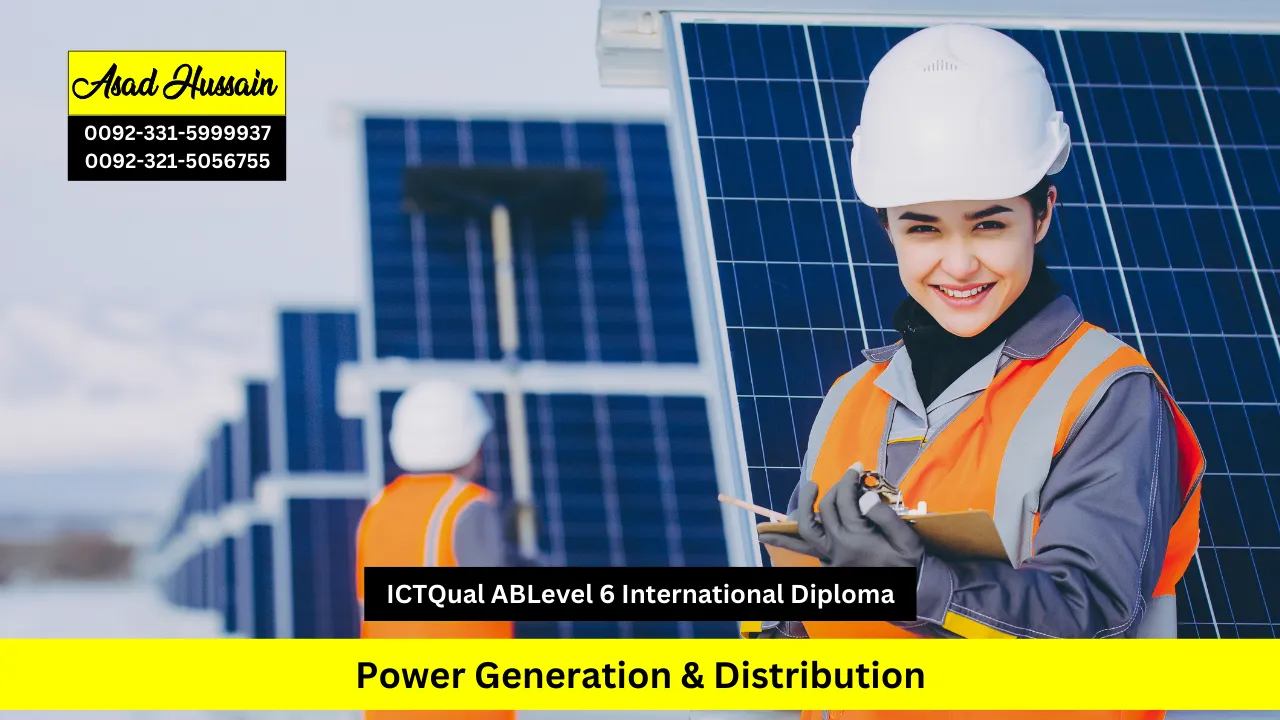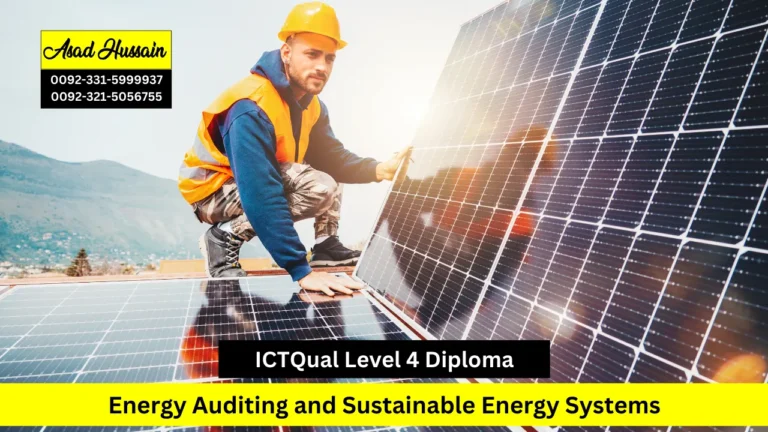The ICTQual ABLevel 6 International Diploma in Power Generation & Distribution is a comprehensive program designed to prepare learners for advanced roles in the global energy sector. As demand for reliable, efficient, and sustainable power supply continues to rise, expertise in power generation and distribution has become essential for driving industrial development, economic growth, and energy security worldwide. This diploma provides learners with the technical knowledge, practical skills, and strategic insights necessary to excel in this critical field.
The ICTQual AB Level 6 International Diploma in Power Generation & Distribution covers a wide range of topics including the principles of electrical power systems, power plant operations, renewable and non-renewable energy sources, grid management, distribution systems, health and safety protocols, and regulatory compliance. Learners will gain the ability to analyze, design, and manage power generation and distribution networks while ensuring efficiency, reliability, and sustainability.
Through case studies, practical applications, and the integration of modern simulation tools, participants will develop problem-solving and decision-making skills to address real-world challenges in energy systems. Graduates of this diploma will be well-prepared for careers in power plant operations, electrical engineering, energy consultancy, and utility management, with the capacity to contribute to both conventional and renewable energy projects.
This internationally recognized qualification not only enhances employability but also positions learners as capable leaders who can support the transition toward smarter, more sustainable power infrastructures.
Program Highlights
Study Units
Year 1 – Foundation in Power Generation & Distribution
- Principles of Electrical Power Systems
- Introduction to Power Generation Technologies
- Fundamentals of Thermal Power Plants
- Basics of Hydroelectric and Renewable Generation
- Electrical Machines and Circuit Theory
- Energy Conversion and Transmission Basics
- Health, Safety, and Environmental Awareness
- Power System Measurement and Instrumentation
- Laboratory Techniques in Electrical Systems
- Technical Report Writing
- Introduction to Power Simulation Software
- Energy Efficiency Fundamentals
Year 2 – Intermediate Power Generation & Distribution
- Advanced Thermal Power Plant Operations
- Renewable Integration in Power Systems
- Electrical Distribution Networks
- Grid Management and Load Analysis
- Power System Protection and Control
- Energy Storage and Backup Systems
- Process Control and Automation in Power Plants
- Energy Management Strategies
- Environmental Compliance and Sustainability in Power
- Quality Control and Assurance in Electrical Systems
- Project Planning and Technical Communication
- Data Analysis for Power Systems
Year 3 – Advanced Power Generation & Distribution
- Advanced Power Plant Optimisation and Troubleshooting
- Project Management in Energy Infrastructure
- Emerging Technologies in Power Generation
- Smart Grid Design and Integration
- Energy Storage Optimisation and Battery Technologies
- Risk Assessment and Hazard Analysis in Power Systems
- Advanced Laboratory Techniques and Field Testing
- Transmission and Distribution Network Planning
- Supply Chain and Logistics in Energy Operations
- Capstone Project in Power Generation & Distribution
- Professional Development and Leadership in Energy
- Strategic Decision-Making in Power Systems
To ensure that learners are well-prepared for success, the following entry requirements apply for the ICTQual AB Level 6 International Diploma in Power Generation & Distribution. These criteria are designed to maintain academic standards and provide learners with the foundation needed to progress effectively through the course.
Age Requirements
- Applicants must be at least 18 years old at the time of enrollment in ICTQual ABLevel 6 International Diploma in Power Generation & Distribution.
- Mature learners with relevant industry experience may also apply, even if they do not meet traditional educational entry pathways.
Educational Requirements
- A Level 5 Diploma or equivalent qualification in engineering, technology, or a related discipline is preferred.
- Alternatively, applicants with strong academic performance in electrical, mechanical, or energy-related studies may be considered.
Professional Experience
- Previous work experience in power generation, distribution, or energy-related fields is advantageous.
- Candidates without direct experience may still be admitted if they demonstrate strong academic potential and commitment to professional development.
English Language Proficiency
- Proficiency in English is required to ensure learners can fully engage with course materials, assignments, and assessments.
- Applicants may demonstrate proficiency through prior qualifications, workplace communication, or recognized English language tests.
The entry requirements for the ICTQual AB Level 6 International Diploma in Power Generation & Distribution are structured to accommodate learners from diverse academic and professional backgrounds while maintaining high standards of excellence.
The ICTQual AB Level 6 International Diploma in Power Generation & Distribution is designed to equip learners with advanced technical knowledge, practical skills, and professional competencies required to excel in the global energy sector. Spanning three years (360 credits), the programme ensures learners develop a strong foundation, intermediate expertise, and advanced capabilities across power generation, electrical distribution, and energy management systems. Upon completion of each unit, learners will demonstrate measurable outcomes aligned with industry standards.
Year 1 – Foundation in Power Generation & Distribution
Principles of Electrical Power Systems
- Explain the basic concepts and structure of electrical power systems.
- Analyse the flow of electrical power from generation to consumption.
- Apply fundamental principles to model simple electrical networks.
Introduction to Power Generation Technologies
- Identify different power generation methods including thermal, hydro, and renewable.
- Evaluate the advantages, limitations, and applications of each technology.
- Apply theoretical knowledge to basic generation scenarios.
Fundamentals of Thermal Power Plants
- Describe the operational principles of thermal power plants.
- Analyse energy conversion efficiency and performance metrics.
- Apply safety and operational standards in practical scenarios.
Basics of Hydroelectric and Renewable Generation
- Explain hydropower and renewable energy generation principles.
- Assess site suitability and environmental impacts of renewable projects.
- Apply basic design and operational knowledge to small-scale installations.
Electrical Machines and Circuit Theory
- Understand and analyse the operation of transformers, motors, and generators.
- Solve circuit theory problems using standard methods.
- Apply practical troubleshooting techniques in laboratory settings.
Energy Conversion and Transmission Basics
- Demonstrate understanding of energy conversion processes.
- Analyse basic transmission system parameters and efficiency.
- Apply concepts to simple transmission network designs.
Health, Safety, and Environmental Awareness
- Identify workplace hazards and apply safety procedures.
- Comply with environmental and regulatory standards in energy projects.
- Promote safe operational practices in laboratory and field environments.
Power System Measurement and Instrumentation
- Operate basic instrumentation for monitoring electrical systems.
- Analyse measurement data for performance evaluation.
- Apply instrumentation principles to improve system reliability.
Laboratory Techniques in Electrical Systems
- Conduct experiments to validate theoretical concepts.
- Interpret experimental data and report findings accurately.
- Develop practical troubleshooting and testing skills.
Technical Report Writing
- Prepare structured technical reports on energy projects.
- Communicate data and findings effectively to technical audiences.
- Apply professional standards for documentation and reporting.
Introduction to Power Simulation Software
- Operate basic power system simulation tools.
- Analyse outputs to evaluate system performance.
- Apply software skills to support planning and operational decisions.
Energy Efficiency Fundamentals
- Understand principles of energy efficiency in power systems.
- Analyse methods to reduce losses in generation and distribution.
- Apply efficiency measures in practical scenarios.
Year 2 – Intermediate Power Generation & Distribution
Advanced Thermal Power Plant Operations
- Analyse operational parameters of thermal power plants.
- Apply optimisation techniques to improve plant efficiency.
- Develop practical maintenance and troubleshooting strategies.
Renewable Integration in Power Systems
- Evaluate methods for integrating renewable energy into grids.
- Analyse the impact of intermittent generation on system stability.
- Apply best practices for hybrid energy systems.
Electrical Distribution Networks
- Design and analyse electrical distribution networks.
- Apply load flow and fault analysis techniques.
- Implement practical strategies for efficient distribution.
Grid Management and Load Analysis
- Monitor and control grid operations to ensure stability.
- Analyse load profiles and demand patterns.
- Apply management strategies to optimize network performance.
Power System Protection and Control
- Understand protection schemes for generators, transformers, and networks.
- Analyse system faults and implement corrective actions.
- Apply control strategies to maintain network reliability.
Energy Storage and Backup Systems
- Evaluate different energy storage technologies.
- Apply storage solutions for reliability and peak shaving.
- Analyse performance and lifecycle considerations.
Process Control and Automation in Power Plants
- Implement automation and control techniques for plant efficiency.
- Monitor system processes using digital tools.
- Apply troubleshooting strategies in automated environments.
Energy Management Strategies
- Analyse energy usage and implement management solutions.
- Apply optimization techniques to reduce operational costs.
- Develop sustainable energy strategies for facilities and networks.
Environmental Compliance and Sustainability in Power
- Apply environmental regulations in energy operations.
- Assess sustainability performance of power generation projects.
- Develop mitigation strategies for environmental impacts.
Quality Control and Assurance in Electrical Systems
- Monitor electrical system performance against standards.
- Apply corrective actions to maintain operational quality.
- Implement continuous improvement practices.
Project Planning and Technical Communication
- Develop detailed project plans for energy projects.
- Communicate technical information effectively to stakeholders.
- Collaborate with multidisciplinary teams to achieve project goals.
Data Analysis for Power Systems
- Apply statistical and analytical techniques to operational data.
- Interpret data for decision-making and optimization.
- Use software tools for accurate reporting and visualization.
Year 3 – Advanced Power Generation & Distribution
Advanced Power Plant Optimisation and Troubleshooting
- Evaluate complex power systems for efficiency and reliability.
- Apply advanced troubleshooting techniques for operational issues.
- Develop strategies for system optimization and performance improvement.
Project Management in Energy Infrastructure
- Plan, execute, and monitor energy infrastructure projects.
- Apply budgeting, scheduling, and risk management practices.
- Evaluate project outcomes against objectives and compliance standards.
Emerging Technologies in Power Generation
- Analyse innovations in energy generation and distribution.
- Evaluate potential applications and scalability in the industry.
- Apply emerging technologies to optimize system performance.
Smart Grid Design and Integration
- Develop strategies for smart grid deployment.
- Integrate renewable and conventional sources for grid stability.
- Apply monitoring and control technologies for efficient operation.
Energy Storage Optimisation and Battery Technologies
- Design advanced storage systems for renewable integration.
- Evaluate battery performance, lifecycle, and cost-effectiveness.
- Apply storage solutions to optimize system reliability.
Risk Assessment and Hazard Analysis in Power Systems
- Identify potential risks in generation and distribution networks.
- Apply quantitative and qualitative risk assessment techniques.
- Develop mitigation and emergency response strategies.
Advanced Laboratory Techniques and Field Testing
- Conduct advanced experiments and field tests on power systems.
- Analyse results to validate theoretical and practical concepts.
- Apply findings to improve operational performance.
Transmission and Distribution Network Planning
- Design transmission and distribution networks to meet demand.
- Apply load forecasting, reliability analysis, and network optimization.
- Evaluate environmental and operational constraints in network planning.
Supply Chain and Logistics in Energy Operations
- Manage procurement, transportation, and logistics for power projects.
- Evaluate supply chain efficiency and cost-effectiveness.
- Apply sustainable practices in energy project logistics.
Capstone Project in Power Generation & Distribution
- Integrate knowledge and skills acquired throughout the programme.
- Conduct independent research or practical project in power systems.
- Present professional reports and project demonstrations.
Professional Development and Leadership in Energy
- Develop leadership and management skills in energy contexts.
- Plan career development and professional growth strategies.
- Apply ethical and professional standards in energy operations.
Strategic Decision-Making in Power Systems
- Apply analytical tools for strategic decisions in energy operations.
- Evaluate operational, financial, and environmental outcomes.
- Demonstrate leadership in planning and executing power projects.
Upon completion of the ICTQual AB Level 6 International Diploma in Power Generation & Distribution, learners will have acquired advanced technical knowledge, practical skills, and professional competencies required to excel in power generation, electrical distribution, and energy management roles. Graduates will be fully prepared for leadership and operational positions in energy companies, utilities, engineering consultancies, and regulatory organizations globally.
The ICTQual AB Level 6 International Diploma in Power Generation & Distribution is designed for individuals who are passionate about advancing their careers in the energy sector, whether through technical expertise, policy-making, or environmental stewardship. The program attracts a diverse range of learners, from students seeking career entry to professionals aiming for leadership roles. Below is the profile of ideal learners who will benefit most from this qualification.
Educational Instructors and Trainers
- Enhance teaching materials with globally recognized industry practices.
- Gain advanced knowledge to train and mentor future energy professionals.
Environmental Advocates and Activists
- Build technical understanding of renewable and conventional energy systems.
- Contribute to sustainable energy policies through evidence-based advocacy.
Students and Recent Graduates
- Develop practical skills that bridge the gap between academic study and industry practice.
- Gain a globally recognized qualification to improve employability in the energy sector.
Career Changers
- Acquire specialized skills to transition into the high-demand energy and utilities industry.
- Build confidence with practical training in energy systems and distribution management.
Policy Makers and Regulators
- Gain technical insight into energy systems for better policy formulation.
- Strengthen the ability to regulate energy operations with global standards in mind.
This diploma welcomes learners from diverse academic, professional, and personal backgrounds who share a common goal of contributing to the global energy sector. Whether entering the workforce, advancing a current career, or influencing energy policy, learners will gain the expertise, credibility, and practical skills to thrive in the fast-evolving field of power generation and distribution.







